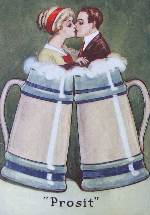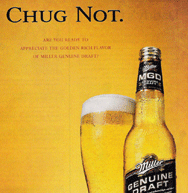Valentine’s Day is not one of the big beer selling holidays. Industrial brewers move a ton of beer for Fourth of July, Memorial Day, the Super Bowl, etc. The December holidays are important for specialty beer producers.
Valentine’s Day? Pretty much another Tuesday. Or is it?
 Realbeer.com certainly has seen enough promotional material to suggest otherwise. Importers such as Merchant du Vin, extolling the virtues of Lindemans lambics; craft brewers such at Boston Beer, working with a New York chef to create special recipes to go with its Chocolate Bock; and a variety of brewpubs offering special dinners … everybody is getting in the act.
Realbeer.com certainly has seen enough promotional material to suggest otherwise. Importers such as Merchant du Vin, extolling the virtues of Lindemans lambics; craft brewers such at Boston Beer, working with a New York chef to create special recipes to go with its Chocolate Bock; and a variety of brewpubs offering special dinners … everybody is getting in the act.
It makes a good story, which is probably why the Liquid Solutions column that Lisa Morrison writes for television station website around the country received unusually prominent play this past week when she turned the spotlight on Valentine’s Day:
When better but the dark nights of February to seduce your sweetie with a sumptuous symphony of the senses? And what better way to woo the object of your affections than with the delectable duo of chocolate — and beer?
That’s right. Chocolate. And beer. This is the Valentine’s Day to get racy. Be daring! Toss aside those erstwhile notions of red wine or champagne and truffles and tempt your honey’s taste buds with a combination that is sure to create fireworks.
(Here’s a link to column as it appeared in Baltimore.)
We think the bottom line should be that beer and chocolate are a treat together, whether in February or October. And romance should be year-round, right?
A couple years back at www.beercook.com, Lucy Saunders quoted Rogue Ales Public House manager Russ Menegat: “Chocolate releases the same dopamine chemicals in the brain as romantic love does, and beer tends to reduce social inhibitions. If that doesn’t sound like the makings of an interesting evening, I don’t know what does…”
Saunders noted you couldn’t grab just any beer, that you should match the flavors of roasted cocoa beans and roasted barley malts. Her story began, “If the Belgian monks who brew beer call it ‘liquid bread,’ then for Valentine’s Day, think of it as ‘liquid cake.'”
Which brings us back to where we started. Are we really talking about Valentine’s Day? Lew Bryson riffs on the subject in his monthly “Buzz”” “… it’s almost amusing to see the array of choices offered for the romantic beer drinker. But the subtext here is plain. This is not about beer for romance. It’s about beer for women.”
It’s been more than a dozen years since Goose Island Brewing founder John Hall said that women were more willing to try – and then enjoy – new beers than men. But marketers still focus on promoting beers that are “easy” (light, fruity, whatever) for women to drink.
That’s silly. Listen to Lew:
I happen to believe that women are just like men when it comes to their tastes. That women, like men, have different tastes as individuals, and that they are not gender-selective for sweets and glop any more than men are. That women deserve to be treated with the same respect when selecting a beer that men do, not a patronizing assumption that they want something light, fruity, candyish, or wine-like. They, like men, may not even know what they like. But I believe that the best way to find that out — for both of us — is to offer them the same kind of choices that I would a man.
For more on this, check out a Roundtable of Women Beer Drinkers from our archives (2002).

 The press release calls it “a beer so nice we named it twice” but if it isn’t exactly double Deschutes’ Mirror Pond Ale it comes close enough. Barley clearly is the star in this beer, with hops – still distinctively Northwest – and wood adding secondary layers of complexity.
The press release calls it “a beer so nice we named it twice” but if it isn’t exactly double Deschutes’ Mirror Pond Ale it comes close enough. Barley clearly is the star in this beer, with hops – still distinctively Northwest – and wood adding secondary layers of complexity. Miller Brewing has already told distributors about its plans revive the flagging Miller Genuine Draft brand by targeting young adults in their 20s and 30s. The campaign goes national March 1, with a “bridge” advertisements already launched. Miller’s advertisements – featuring the catch phrase, “Beer. Grown Up.†– are aimed at those in their late 20s to 30s who have drifted away from mainstream beers and switched to other alcohol-based drinks, or even craft beers or imports.
Miller Brewing has already told distributors about its plans revive the flagging Miller Genuine Draft brand by targeting young adults in their 20s and 30s. The campaign goes national March 1, with a “bridge” advertisements already launched. Miller’s advertisements – featuring the catch phrase, “Beer. Grown Up.†– are aimed at those in their late 20s to 30s who have drifted away from mainstream beers and switched to other alcohol-based drinks, or even craft beers or imports. We learned long ago that the best time to buy beer at our local Oktoberfest is when the St. Pauli Girl shows up to sign posters – because that’s where the line will be.
We learned long ago that the best time to buy beer at our local Oktoberfest is when the St. Pauli Girl shows up to sign posters – because that’s where the line will be.